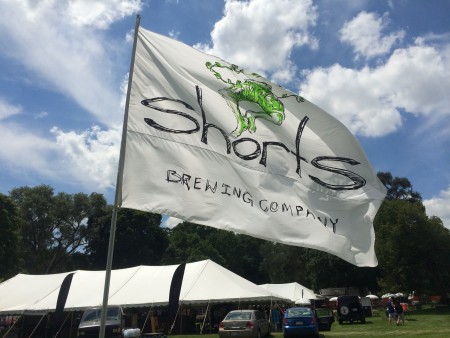Flavorful, scarce, high risk and high reward are a few terms that can be applied to the art of barrel aging beer. Here at Short’s, we’ve dabbled in barrel aging, but recently we have been expanding these projects to different varieties of barrels and even bottling some of these brews in our Private Stache series. As we’re expanding into this new territory, we thought it would be important to take a look at where this unique style tradition originated.
Thousands of years ago, the Greeks traded wines and became world renowned for their flavorful products. As the demand increased, they had to create ways to store the wine as it was transported far distances; vessels made of clay and skins did not hold up as well on long journeys. Wood barrels were constructed and began to leave a preferable flavor to the wine over the other container options. As these barrels were expensive and difficult to make, they were used repeatedly creating the unique flavors that would seep into the porous wood.
Colonial America was attributed with the cultivation of American whiskey. Anyone with an excess of grain from their crop could distill their own whiskey. As the drink popularized, distilleries worked to make this beverage to be of the highest quality. Tennessee Whiskey and Kentucky Bourbon set themselves apart as well crafted spirits made only in specific geographic regions. To be qualified as bourbon, the product must made in the United States and aged in new charred oak barrels. After the barrels are used they are then sold to other international distilleries or now, breweries.
Goose Island was the first brewery to age a beer (Goose Island’s Bourbon County Stout) in bourbon barrels in 1992. Since then barrel aging beers has been pushing the limits of what is possible, and brewers are continuously finding new beers to age in various types of wine and spirit barrels.
Short’s joined in on the barrel aging game in 2006 with our 2006 Anniversary Ale, a grapefruit IPA aged in bourbon barrels. We’ve done quite a bit with barrels since then, and continue to expand our barrel aging program. The barrels are treated like another ingredient. They can make a substantial contribution to the flavor of the finished beer, so we look for beers that will compliment or be improved by the flavor of the barrel. For example, stouts tend to do well in bourbon barrels as the char and vanilla characteristics work well with the chocolate notes and roasty bitterness present in this style. Sour beers also lend themselves to barrel aging. Barrels let in a tiny bit of oxygen, which helps some of the bacteria and yeast (brettanomyces specifically) do it’s work to sour the beer and develop good funky attributes.
Barrel aging can be a risky process, with the top concerns including microbial contamination and exposure to oxygen. Microbial contamination occurs when beer spoilage microorganisms feed on the beer and can cause excessive carbonation, acidity, or unfavorable flavors and aromas. To ensure the quality of our barrel aged beers, the Short’s Quality and Brewing teams work together to do microbial analysis before and after the aging, and purge the barrels with CO2 prior to filling, to keep the oxidation low. Quality is of the utmost concern, so doing everything possible to keep the beer tasting great is a top priority.
We have a lot coming around the bend in our barrel aging program. Recently you may have enjoyed our Maple Bourbon Barrel Magician, which was our Magician Red Ale aged in bourbon barrels that previously aged American Spoon maple syrup. Some of our other bad-ass barrels include bourbon, red and white wine, gin, tequila, rum, oak, we even have an absinthe barrel! We’re not telling you what we have aging in these quite yet, but we can assure you it will be a delicious treat. Until then, stop by the pub on Saturday, October 31st starting at 11:00 am to pick up a bottle or two of Bourbon Evil Urges, our latest Private Stache release. The rest will be coming out soon enough…
Photo Credit to Bellaire Brewer, Luke Whitley



